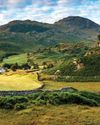
Ireland and France. These were soon published anonymously as The Letters of a Dead Man (183031) and enjoyed considerable success.
The Prince, whose home lay in modern-day Saxony, had amicably divorced and was in search of a rich English bride whose fortune might mend his own. His letters reflect the cool detachment necessary to contemplate such a scheme, although he never carried it into effect. The result is an essentially admiring, but penetrating and occasionally unsparingportrait of English society and domestic life.
He quickly perceived that the driving force behind the social activities he observed, was 'not nobility, not wealth, but an entirely new power: Fashion-what he termed ton'a goddess who in England alone, reigns...with despotic and inexorable sway-though always represented to mortal eyes by a few clever usurpers of either sex.
One of those 'clever usurpers' was George IV, whose constitutional rule during the madness of his father, George III, from 1811-20, has bequeathed us the term 'Regency' to describe the Arts between about 1790 and 1830. He made fashionable, for example, the idea of serving dinner, the main meal of the day, in the evening, rather than at about 3pm. At a stroke, the Georgian dining room became a nighttime interior (Fig 1). He was also a keen advocate of the new household technologies that were transforming domestic life in this period, such as central heating, compact kitchen stoves and gas lighting.
The kingdom that Prince Pückler-Muskau visited was brimming with self-confidence. Having emerged victorious from the Napoleonic wars, Britain knew itself to be the most powerful nation in the world. It was also the richest. At home that money was invested in land, the ownership of which both guaranteed political power-it was not until the Great Reform Act of 1832 that the emphasis of Parliamentary representation swung from the country to the city and offered enrichment.
This story is from the September 14, 2022 edition of Country Life UK.
Start your 7-day Magzter GOLD free trial to access thousands of curated premium stories, and 9,000+ magazines and newspapers.
Already a subscriber ? Sign In
This story is from the September 14, 2022 edition of Country Life UK.
Start your 7-day Magzter GOLD free trial to access thousands of curated premium stories, and 9,000+ magazines and newspapers.
Already a subscriber? Sign In

Shhhhhh...
THERE is great delight to be had poring over the front pages of COUNTRY LIFE each week, dreaming of what life would be like in a Scottish castle (so reasonably priced, but do bear in mind the midges) or a townhouse in London’s Eaton Square (worth a king’s ransom, but, oh dear, the traffic) or perhaps that cottage in the Cotswolds (if you don’t mind standing next to Hollywood A-listers in the queue at Daylesford). The estate agent’s particulars will give you details of acreage, proximity to schools and railway stations, but never—no, never—an indication of noise levels.

Mission impossible
Rubble and ruin were all that remained of the early-19th-century Villa Frere and its gardens, planted by the English diplomat John Hookham Frere, until a group of dedicated volunteers came to its rescue. Josephine Tyndale-Biscoe tells the story

When a perfect storm hits
Weather, wars, elections and financial uncertainty all conspired against high-end house sales this year, but there were still some spectacular deals

Give the dog a bone
Man's best friend still needs to eat like its Lupus forebears, believes Jonathan Self, when it's not guarding food, greeting us or destroying our upholstery, of course

Shake your pompom
Some can rock a bobble hat, others will always resemble Where's Wally, but still this knitted creation belongs on every hat rack, says Harry Pearson

Where time stands still
Memorials are our nation’s collective memory, built to endure and ensure that achievements, individuals and disasters are never forgotten. Susan Owens takes an emotive tour around the British Isles in 50 monuments

'Eating is an agricultural act'
Farmers need to convince consumers that the choices they make are integral to preserving the British environment

Welcome home
Despite the trundling tractor and buzzing shears, our ancestors would still recognise the rhythm, ritual and practices of the traditional hill farm, argues John Lewis-Stempel

When the saints march in The Cathedral and Abbey Church of St Albans, Hertfordshire, part II
In the second of two articles, John Goodall examines some of the recent changes made to highlight the saints associated with this ancient church

All gone to pot
Jars, whether elegant in their glazed simplicity or exquisitely painted, starred in London's Asian Art sales, including an exceptionally rare pair that belonged to China's answer to Henry VIII